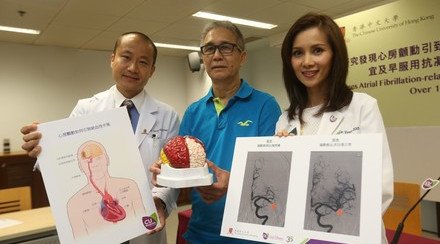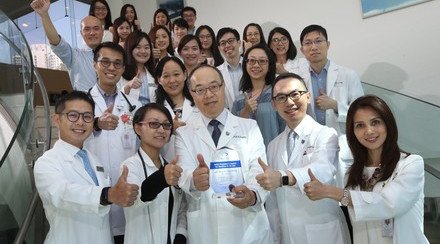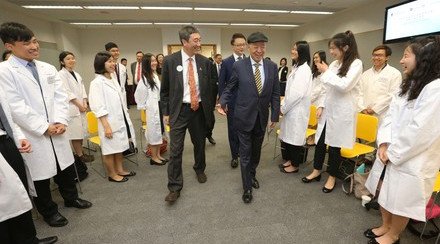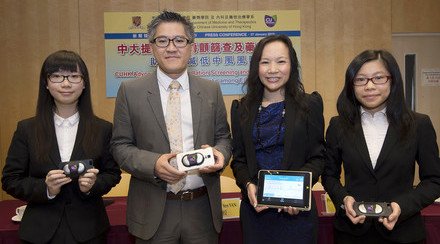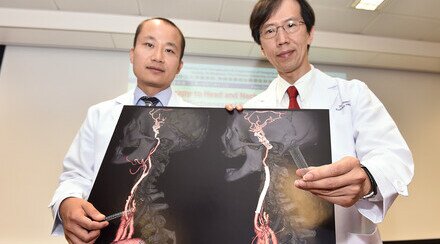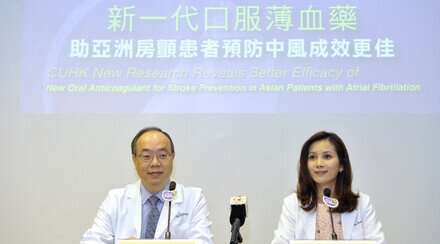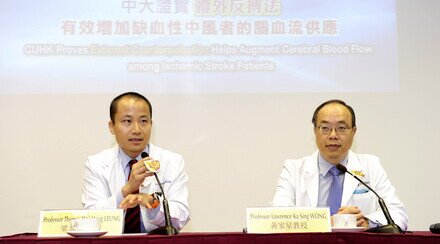Dr. Lui Che Woo Distinguished Professor Public Lecture by Prof. Steven C. Cramer on Brain Repair after Stroke
Prof. Steven C. Cramer, Vice-Chair of Research, Department of Neurology, School of Medicine, University of California, Irvine (UCI) in the US was invited by the Lui Che Woo Institute of Innovative Medicine at Faculty of Medicine of The Chinese University of Hong Kong (CUHK) to be the first Dr. Lui Che Woo Distinguished Professor. Professor Cramer delivered a public lecture on ‘Brain Repair after Stroke’ today (8 January).
A stroke happens when blood flow to the brain is interrupted, which rapidly results in permanent brain injury. Although stroke symptoms are highly variable, major deficits persist in many persons making stroke among the leading causes of human disability. Many persons experience some degree of spontaneous behavioral recovery after a stroke, particularly during the initial weeks-months. This recovery is not because brain areas destroyed by stroke grow back – regrowth is limited or absent in adult human brains. Instead, spontaneous recovery is due to changes within those brain areas that survived the stroke, a process referred to as brain plasticity. Features of brain plasticity after stroke resemble those found in the brain during childhood development, or during normal learning. A number of restorative therapies have been described that amplify or extend post-stroke brain plasticity, and therefore have the potential to improve behavioural outcome in many patients.
In the lecture, Professor Cramer shared his research findings, in particular the major impact that stroke has on patients and society, and discussed forms of brain plasticity that arise after a stroke and the effectiveness of emerging therapies for brain repair.
Appointed as the Director of Neuroimaging Core of the UCI Institute for Clinical & Translational Science since 2003 and Clinical Director of UCI Stem Cell Research Center since 2006, Professor Cramer concurrently holds the position of the Vice-Chair of Research, Department of Neurology at UCI in the US.
Professor Cramer’s research has focused on CNS (central nervous system) repair in humans, especially those with stroke or with spinal cord injuries. He and his research teams have been developing innovative therapies, including the development of a robot for delivering rehabilitation therapy to the distal upper extremity, a brain-computer interface to promote gait improvement, a system for delivery of home-based tele-rehabilitation, and a stem cell therapy for stroke patients which has been approved by the US Food and Drug Administration. Professor Cramer is also the principal investigator of a multicenter international Phase II GlaxoSmithKline clinical trial examining the first monoclonal antibody studied to promote neural repair. For his outstanding contributions in the field, Professor Cramer received numerous local and international awards and honors including Nicholas Foundation Prize, membership of the Blue Ribbon Panel on Rehabilitation Research at the National Institutes of Health, and chairmanship of the Rehabilitation and Recovery Committee, American Heart Association. Professor Cramer is the founder of the Orange County Stroke Society and a cofounder of the Orange County Stroke Rehab Network. He also serves as Assistant Editor of the journal Stroke, as well as on the Editorial Board of Neurorehabilitation and Neural Repair.
About Dr Lui Che Woo Distinguished Professor Public Lecture
With the generous support of the Lui Che Woo Foundation Limited, the Lui Che Woo Institute of Innovative Medicine was established in 2012 under the Faculty of Medicine at CUHK which is dedicated to the advancement of three focused initiatives, namely BRAIN (Brain Research And Innovative Neuroscience), SMART (Sports Medicine And Regenerative Technology) and CARE (Cardiovascular Advancement, Research and Education). The Institute will explore innovative methods of diagnosis and treatment through a cross-disciplinary approach in management, with the aims of exploring new methods of medical diagnosis and treatment in three aforesaid areas of medicine. A prominent scientist in the field of BRAIN, SMART or CARE will be invited each year for scholarly exchange and delivery of a public lecture to promote health education in the community.
.jpg)
Prof. Steven Cramer, Vice-Chair of Research, Department of Neurology, School of Medicine, University of California, Irvine delivers a public lecture on ‘Brain Repair after Stroke’ for the Lui Che Woo Institute of Innovative Medicine, Faculty of Medicine, CUHK.
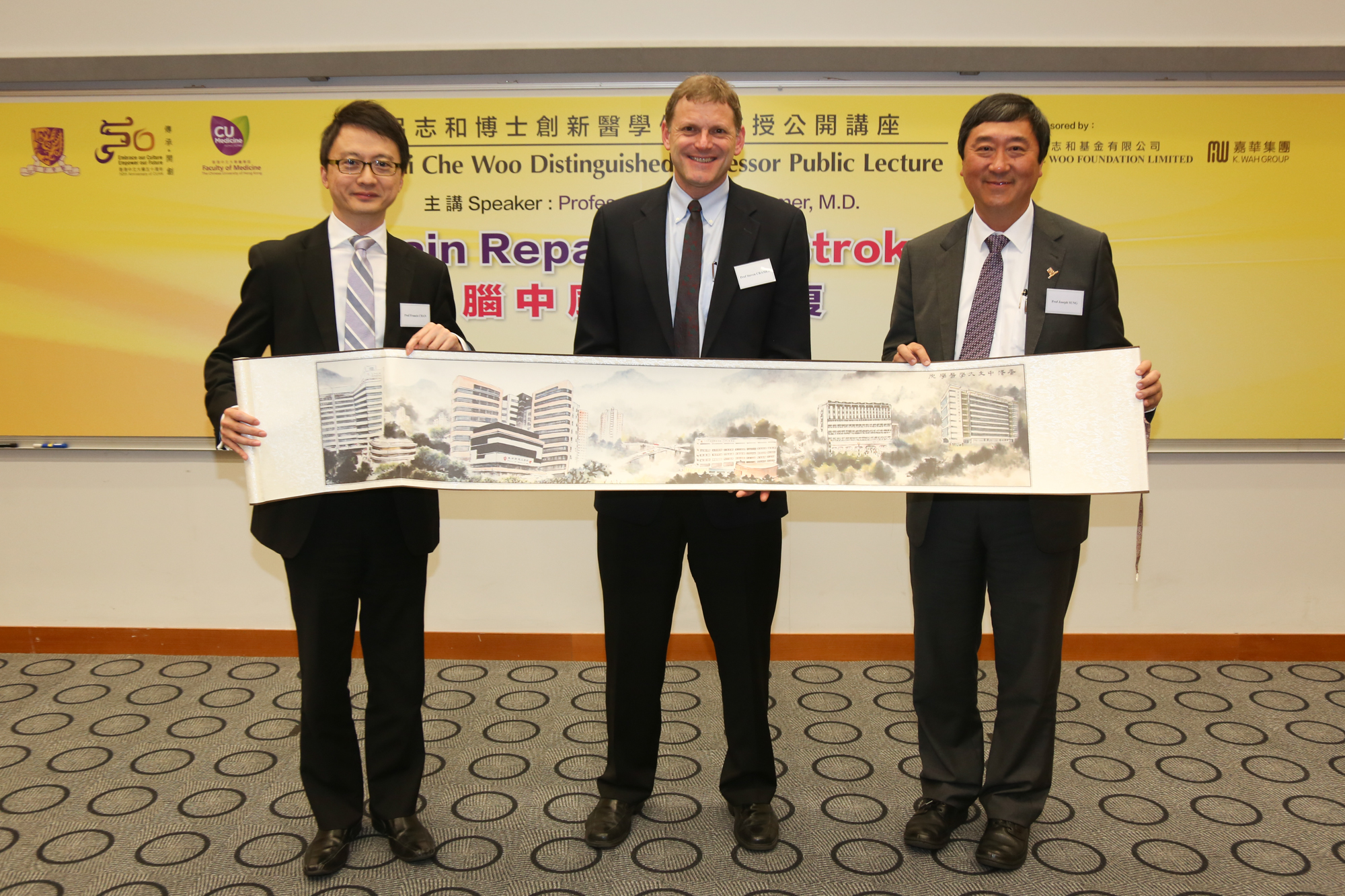
Prof. Joseph Sung, Vice-Chancellor and President of CUHK (right) and Prof. Francis Chan, Dean of Medicine and Director of the Lui Che Woo Institute of Innovative Medicine, CUHK (left) present a souvenir to Prof. Steven Cramer.
.jpg)
A group photo of Prof. Steven Cramer and guests.




